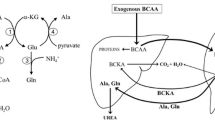Abstract
Malnutrition is frequently seen in patients with inflammatory bowel disease, and parenteral or enteral nutrition is considered essential in this patient group. However, many patients with Crohn's disease have difficulties in gaining weight in response to overfeeding, suggesting reduced energy retention. Substrate utilization and nutrient balances as well as changes in body composition were followed in 10 patients with Crohn's disease immediately in the course of remission on low-dose steroid treatment, during an eight-day period of continuous enteral nutrition at constant (protocol 1:1.5-fold basal energy expenditure) and increasing (protocol 2:0.5- to 2.0-fold basal energy expenditure) nutrient supply. Energy, substrate, and nitrogen balances all became positive in response to overfeeding. However, fat was predominantly oxidized at an infusion rate of 1.2 g/kg body wt/day, whereas carbohydrates and proteins were effectively stored. A positive energy balance was reached at an energy infusion rate exceeding 31 kcal/kg body wt/day and corresponding substrate supplies of 1.6, 1.7, and 1.1 g/kg body wt/day for carbohydrates, fat, and protein, respectively. Nitrogen balance normalized at a supply of 0.14 g/kg body wt/day, which also reduced myofibrillar protein breakdown. Considering the relative contributions made by these nutrients in the diets, an accumulation of carbohydrates and protein but a depletion in fat became evident from nutrient balances. In fact, body weight increased by 0.12 kg/day, which was explained by an increased extracellular (+0.18 kg/day) and body cell mass (+0.04 kg/day) at reduced fat mass (−0.10 kg/day). Concomitantly, plasma T3 and insulin secretion both increased, whereas sympathetic nervous system activity decreased with overfeeding. This is contrary to data observed in healthy subjects. Fat instead of glucose is the major energy substrate during the clinical course of treatment in patients with Crohn's disease. These patients therefore store less of surplus fuels as fat explaining their difficulties in gaining weight.
Similar content being viewed by others
References
Flatt JP: Differences in the regulation of carbohydrate and fat metabolism and their implications for body weight maintenance.In Hormones, Thermogenesis and Obesity. H Lardy, F Stratman (eds), New York, Elsevier, 1989, pp 3–18
Sims EAH, Danforth E: Expenditure and storage of energy in man. J Clin Invest 79:1019–1025, 1987
Garrow JS: Obesity and Related Diseases. Edinburgh, Churchill Livingstone, 1988
Rosenberg IH, Bengoa JM, Sitrin MD: Nutritional aspects of inflammatory bowel disease. Annu Rev Nutr 6:463–484, 1986
Greenberg GR: Inflammatory bowel disease.In Nutrition and Metabolism in Patient Care. JM Kinney, KN Jeejeebhoy, GL Hill, OE Owen (eds). Philadelphia, WB Saunders, 1988, pp 266–280
Powell-Tuck J: Nutritional consequences of gastrointestinal diseases. Balliere's Clin Gastroenterol, 2:715–728, 1988
Alfonso JJ, Rombeau JL: Nutritional care for patients with Crohn's disease. Hepato-Gastroenterol 37:32–41, 1990
Clark ML: Nutrition in inflammatory bowel disease. Can J Gastroenterol 2(suppl A):18A-20A, 1988
Depew WT: The role of nutritional support in inflammatory bowel disease. Can J Gastroenterol 4(suppl A):30A-36A, 1990
Müller MJ, von zur Mühlen A, Lautz HU, Schmidt FW, Daiber M, Hürter P: Energy expenditure in children with type 1 diabetes mellitus: Evidence for increased thermogenesis. Br Med J 299:487–491, 1989
Müller MJ, Fenk A, Lautz HU, Selberg O, Canzler H, Balks HJ, von zur Mühlen A, Schmidt E, Schmidt FW: Energy expenditure and substrate metabolism in ethanol-induced liver cirrhosis. Am J Physiol 260:E338-E344, 1991
Miholic J, Meyer HJ, Müller MJ, Weimann A, Pichlmayr R: Nutritional consequences of total gastrectomy. Surgery 108:488–494, 1990
Müller MJ, Paschen U, Seitz HJ: Effect of ketone bodies on glucose production and utilization in the miniature pig. J Clin Invest 74:249–261, 1984
Müller MJ, von Schütz B, Huhnt HJ, Zick R, Mitzkat HJ, von zur Mühlen A: Glucoregulatory function of thyroid hormones: Role of prevailing plasma glucose level. J Clin Endocrinol Metab 63:62–71, 1986
Müller MJ, Burger AG, Ferrannini E, Jequier E, Acheson KJ: Glucoregulatory function of thyroid hormones: Role of pancreatic hormones. Am J Physiol 256:E101-E110, 1989
Müller MJ, Rieger A, Willmann O, Lautz HU, Balks HJ, von zur Mühlen A, Canzler H, Schmidt FW: Metabolic responses to lipid infusions in patients with liver cirrhosis. Clin Nutr 11:193–206, 1992
Danforth E: Diet and obesity. Am J Clin Nutr 41:1132–1145, 1985
Flatt JP, Ravussin E, Acheson KJ, Jequier E: Effects of dietary fat on postprandial substrate oxidation and on carbohydrate and fat balances. J Clin Invest 76:1019–1024, 1985
Abbott WGH, Howard BV, Christin L, Freymond D, Lillioja S, Boyce VL, Anderson TE, Bogardus C, Ravussin E: Short-term energy balance: relationship with protein, carbohydrate, and fat balances. Am J Physiol 255:E332-E337, 1988
Casper K, Matthews DE, Heymfield SB: Overfeeding: Cardiovascular and metabolic response during continuous formula infusion in adult humans. Am J Clin Nutr 52:602–609, 1990
Flatt JP: Dietary fat, carbohydrate balance, and weight maintenance: Effects of exercise. Am J Clin Nutr 45:296–306, 1987
Danforth E, Burger AG: The impact of nutrition on thyroid hormone physiology and action. Annu Rev Nutr 9:201–227, 1989
Forbes GB, Brown MR, Welle SL, Underwood LE: Hormonal response to overfeeding. Am J Clin Nutr 49:608–611, 1989
Müller MJ: Hormonal and metabolic determinants of energy expenditure in humans.In Hormones and Nutrition in Obesity and Cachexia. MJ Müller, E Danforth, AG Burger, U Siedentopp (eds). Heidelberg, Springer-Verlag, 1990, pp 26–39
Landsberg L, Young JB: Fasting, feeding and regulation of the sympathetic nervous system. N Engl J Med 298:1295–1301, 1978
Author information
Authors and Affiliations
Rights and permissions
About this article
Cite this article
Müller, M.J., Schmidt, L.U., Körber, J. et al. Reduced metabolic efficiency in patients with Crohn's disease. Digest Dis Sci 38, 2001–2009 (1993). https://doi.org/10.1007/BF01297076
Received:
Revised:
Accepted:
Issue Date:
DOI: https://doi.org/10.1007/BF01297076




